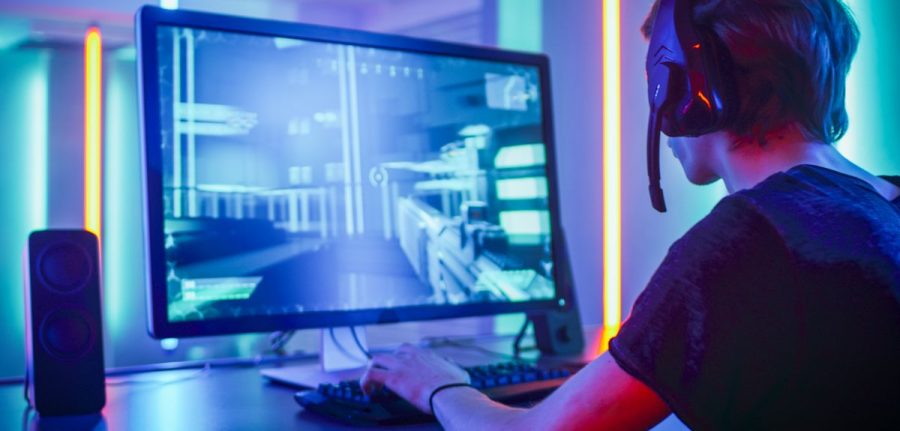Video Games: A Playground for Leveling Up Social Interaction and Skill Development
January 5, 2022
Video games have been around since the 1960s, amassing over 3.24 billion gamers in 2021 and providing endless amounts of fun. Video games have developed so much since then, starting from small games like Pong and crowding around a small TV, to massively multiplayer games online. Playing video games is an all-inclusive experience; anyone is free to play a wide variety of titles, ranging from relaxing puzzles to first-person shooters. Not only are video games a way for people to put different skills to use, but also an opportunity to build long-lasting friendships and to improve social interactions.
I myself have been playing video games for more than ten years. Throughout my time of playing, I’ve found that they do provide a lot of social interaction and as a result help develop my social skills. Since playing video games, I’ve found that it is easier to talk to new people and put myself into social spaces. They also definitely have improved my mood and helped ease my anxiety countless times.
During the lockdowns caused by the pandemic, many people flocked to video games which helped many cope with stress and loss of normalcy. With no one to talk to and not being able to physically interact with other people, I was filled with anxiety and uncertainty. However, turning to video games provided me with social interaction while I dwelled in my room. Without video games, I probably would have gone mad. I was able to talk to people and make new friends (two of which are included in this story) from across the world through different gaming communities .I was able to talk about my worries, my interests, how school was going, and endless friendly banter. These friendships are what kept me going when my real-life friends hadn’t been so inclusive.
However, playing video games has earned a negative reputation through the years. Playing games has been stigmatized as lazy and associated with aggression. Parents often claim that video games have no value and are just a waste of time. Even Senators like Josh Hawley seem to blame video games for the destruction of the United States and manhood. What people don’t consider are the positive aspects such as social interaction, critical thinking, problem-solving, leadership, adaptability, and much more.
A study was done in 2017 by Matthew Barr, who studies video games and gamer culture at the University of Glasgow in Scotland, where 16 university students would have to play video games for 14 hours. Before conducting the study, Barr had everyone fill out a questionnaire about their real-life skills. After completing the 14 hours the results were revealed to be positive. “Resourcefulness scores increased significantly for 81 percent of the gamers. Adaptability scores increased by 75 percent. And communication skills scores increased for 69 percent of gamers.” The experiment concluded that playing video games can lead to the development of various skills, the games played ranged from puzzles to action games and they proved to be beneficial.
Action or violent games are almost always under scrutiny from parents and other figures such as psychologists or doctors. Because of the violent or competitive nature that these games often present, such as Assassins Creed or Doom, they are often associated with aggression. In events of mass murder, such as the El Paso Walmart shooting in 2019, people tend to point fingers at video games, claiming that they are a catalyst for killing.
Despite these claims, studies show that video games shouldn’t be blamed. “Violence is a complex social problem that likely stems from many factors that warrant attention from researchers, policymakers, and the public,” states the American Psychological Association president Sandra Shullman. “Attributing violence to violent video gaming is not scientifically sound and draws attention away from other factors.”
Additionally, two studies were conducted in 2008 where a group of people could choose whether or not to play a violent or non-violent video game. It was found that “neither randomized exposure to violent-video-game conditions nor previous real-life exposure to violent video games caused any differences in aggression.” The second study dealt with correlations between trait aggression, violent criminal acts, and exposure to both violent games and family violence. The results demonstrated that trait aggression, family violence, and male gender were predictive of violent crime, but exposure to violent games was not.
“Video games don’t cause aggression. Games such as GTA and Call Of Duty, despite being violent in nature, do not reflect the actions of those who play it in any way,” says Callum Buck, a 16-year-old gamer from Blackburn, England who I met through playing online. “If there are any arguments saying that the kids spend too much time on them which causes the violence, that should be down to the parents not having proper limits in place.”
Instead, Buck sees video games as an opportunity to make many new friends across the world and says they’ve made him “more confident when talking to new people.” Without video games, I would not have been able to meet Buck who lives thousands of miles away and despite the distance is one of my most cherished friends.
Usually, people tend to think that if you play video games you are socially awkward and wasting your time. However, it is actually the opposite. When playing games you almost always have to have some sort of social interaction. And through playing, people build meaningful relationships and gain happiness.
One 2009 study shows that Gaming helps children and youth generate positive feelings. “Several studies have shown a causal relation between playing preferred video games and improved mood or increases in positive emotion. For example, studies suggest that playing puzzle video games— games with minimal interfaces, short-term commitments, and a high degree of accessibility (e.g., Angry Birds, Bejeweled II)— can improve players’ moods, promote relaxation, and ward off anxiety.
Additionally, one study from 2009 found that prosocial video games later led to more social behaviors. “More specifically, playing prosocial games led to causal, short-term effects on “helping” behaviors, and longitudinal effects were also found, in that children who played more prosocial games at the beginning of the school year were more likely to exhibit helpful behaviors later that year.”
“Games have helped me gain social and problem-solving skills, be able to meet new people with the same interests, and make friends in an easy way,” says 16-year-old gamer Benjamin Whittaker of England. “They allow me to connect with people, I also believe they can relieve stress as you can take your anger/stress out through the game and they bring happiness.” Whittaker is another example of how gaming can help build friendships as I was able to quickly befriend him during the pandemic while playing a game of Valorant and since then he has introduced me to tons of people.
As an avid gamer, I’ve had a lot of time to really think about how video games have impacted not only my life, but the lives of other gamers. Yes, we may enjoy joyriding in Zentornos in Grand Theft Auto 5, but this doesn’t mean I’m going to steal a car and ram into people in real life. But while society continues to demonize video games, we are able to take advantage of the many skills and experiences offered through gaming.






































